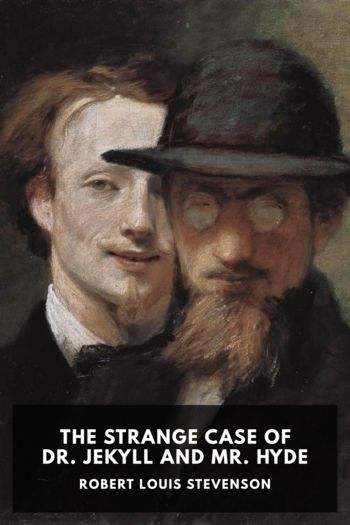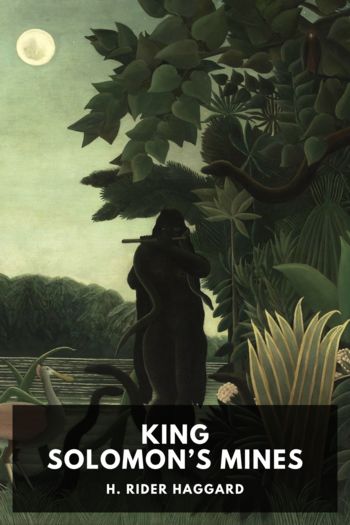Catriona - Robert Louis Stevenson (the kiss of deception read online .TXT) 📗

- Author: Robert Louis Stevenson
Book online «Catriona - Robert Louis Stevenson (the kiss of deception read online .TXT) 📗». Author Robert Louis Stevenson
The two chance shots that seemed to point at Alan and the daughter of James More, struck me hard; and I fled from the eldritch creature, casting her a baubee, which she continued to sit and play with under the moving shadows of the hanged.
My way down the causeway of Leith Walk would have been more pleasant to me but for this encounter. The old rampart ran among fields, the like of them I had never seen for artfulness of agriculture; I was pleased, besides, to be so far in the still countryside; but the shackles of the gibbet clattered in my head; and the mops and mows of the old witch, and the thought of the dead men, hag-rode my spirits. To hang on a gallows, that seemed a hard case; and whether a man came to hang there for two shillings Scots, or (as Mr. Stewart had it) from the sense of duty, once he was tarred and shackled and hung up, the difference seemed small. There might David Balfour hang, and other lads pass on their errands and think light of him; and old daft limmers sit at leg-foot and spae their fortunes; and the clean genty maids go by, and look to the other side, and hold a nose. I saw them plain, and they had grey eyes, and their screens upon their heads were of the Drummond colours.
I was thus in the poorest of spirits, though still pretty resolved, when I came in view of Pilrig, a pleasant gabled house set by the walkside among some brave young woods. The laird’s horse was standing saddled at the door as I came up, but himself was in the study, where he received me in the midst of learned works and musical instruments, for he was not only a deep philosopher but much of a musician. He greeted me at first pretty well, and when he had read Rankeillor’s letter, placed himself obligingly at my disposal.
“And what is it, cousin David?” says he—“since it appears that we are cousins—what is this that I can do for you? A word to Prestongrange? Doubtless that is easily given. But what should be the word?”
“Mr. Balfour,” said I, “if I were to tell you my whole story the way it fell out, it’s my opinion (and it was Rankeillor’s before me) that you would be very little made up with it.”
“I am sorry to hear this of you, kinsman,” says he.
“I must not take that at your hands, Mr. Balfour,” said I; “I have nothing to my charge to make me sorry, or you for me, but just the common infirmities of mankind. ‘The guilt of Adam’s first sin, the want of original righteousness, and the corruption of my whole nature,’ so much I must answer for, and I hope I have been taught where to look for help,” I said; for I judged from the look of the man he would think the better of me if I knew my questions.11 “But in the way of worldly honour I have no great stumble to reproach myself with; and my difficulties have befallen me very much against my will and (by all that I can see) without my fault. My trouble is to have become dipped in a political complication, which it is judged you would be blythe to avoid a knowledge of.”
“Why, very well, Mr. David,” he replied, “I am pleased to see you are all that Rankeillor represented. And for what you say of political complications, you do me no more than justice. It is my study to be beyond suspicion, and indeed outside the field of it. The question is,” says he, “how, if I am to know nothing of the matter, I can very well assist you?”
“Why, sir,” said I, “I propose you should write to his lordship, that I am a young man of reasonable good family and of good means: both of which I believe to be the case.”
“I have Rankeillor’s word for it,” said Mr. Balfour, “and I count that a warrandice against all deadly.”
“To which you might add (if you will take my word for so much) that I am a good churchman, loyal to King George, and so brought up,” I went on.
“None of which will do you any harm,” said Mr. Balfour.
“Then you might go on to say that I sought his lordship on a matter of great moment, connected with His Majesty’s service and the administration of justice,” I suggested.
“As I am not to hear the matter,” says the laird, “I will not take upon myself to qualify its weight. ‘Great moment’ therefore falls, and ‘moment’ along with it. For the rest, I might express myself much as you propose.”
“And then, sir,” said I, and rubbed my neck a little with my thumb, “then I would be very desirous if you could slip in a word that might perhaps tell for my protection.”
“Protection?” says he. “For your protection? Here is a phrase that somewhat dampens me. If the matter be so dangerous, I own I would be a little loath to move in it blindfold.”
“I believe I could indicate in two words where the thing sticks,” said I.
“Perhaps that would be the best,” said he.
“Well, it’s the Appin murder,” said I.
He held up both the hands. “Sirs! sirs!” cried he.
I thought by the expression of his face and voice that I had lost my helper.
“Let me explain …” I began.
“I thank you kindly, I will hear no more of it,” says he. “I decline in toto to hear more of it. For your name’s sake and Rankeillor’s, and perhaps a little for your own, I will do what I can to





Comments (0)